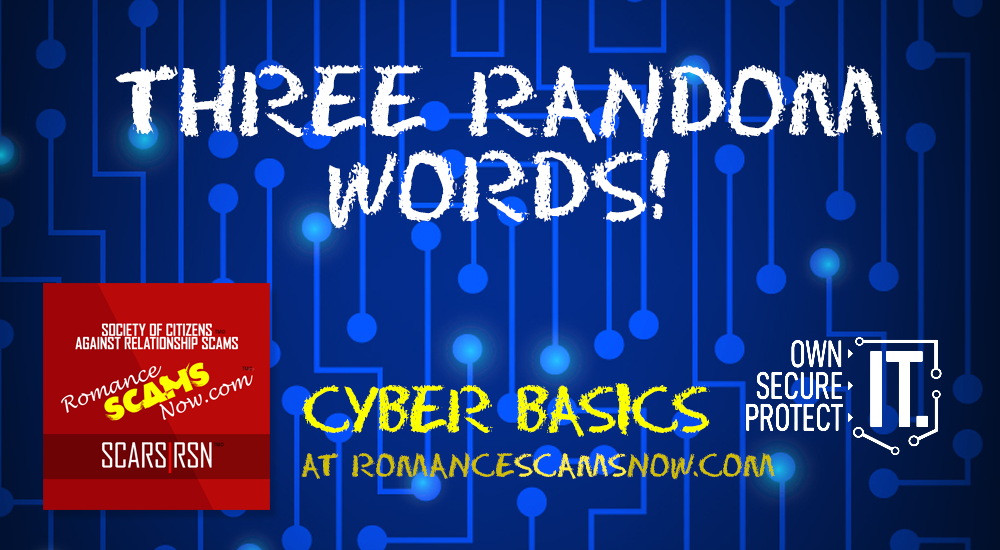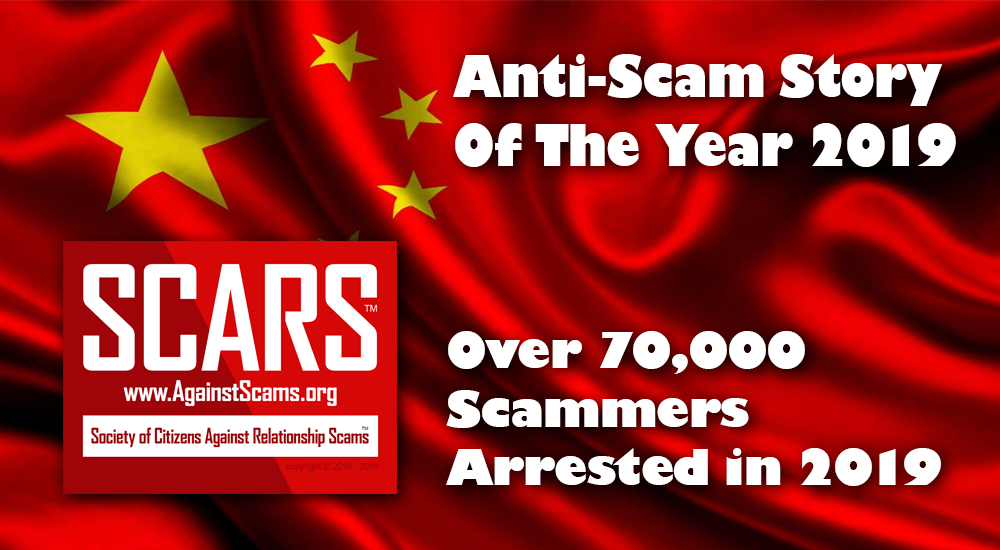
SCARS Institute’s Encyclopedia of Scams™ Published Continuously for 25 Years

SCARS™ Scam News: Anti-Scam Story Of The Year! Arrests Exceed 70,000 Worldwide in 2019
WORLDWIDE ARRESTS OF CYBERCRIMINALS HAVE PASSED 70,000 – COMPARED TO 21,000 IN 2018
China alone is responsible for more than 60,000 cyber/scammer arrests in 2019 [Source: China’s Ministry of State Security & China News Service – as related by SCARS|CHINA]
Internet Crime Crackdown Leads To 60,000 Arrests
Officially Announced On November 15, 2019 By The Official PRC News Agency
Chinese public security authorities cracked more than 45,000 cybercrime cases and arrested over 60,000 suspects in the first 10 months of this year (2019) during an ongoing campaign to clean up the internet, the Ministry of Public Security said at a news conference on Thursday.
Almost 30,000 cases related to the illegal infringement of people’s personal information, hacking, and fraud were cracked, with over 37,000 suspects arrested for involvement in such cases, said Wang Yingwei, Party chief of the Ministry’s Cybersecurity bureau.
The special one-year campaign, launched by the Ministry in January, aims to crack down on cybercrimes, including the stealing and trading of personal information, hacking and other online crimes.
“In recent years, police have been encountering new types of cybercrime, especially with the emergence of crimes related to the dark web,” Wang said. “Although the concealment offered by the dark web poses a challenge to the police, we will intensify the crackdown on such crimes.”
Sixteen cases related to dark web crimes were filed nationwide this year, with 25 suspects arrested. Police said two had been sentenced to jail and 23 are in criminal detention. While some of these crimes are capital crimes, no mention was made of any executions.
During the campaign, police also intensified the crackdown on online scams and punished a number of companies that provided technological support and data services to online peer-to-peer scamming platforms.
In a typical case, a man surnamed Song told police in Qitaihe, Heilongjiang province, on May 25 that after he borrowed 1,500 yuan ($210) from a mobile loan app the platform recommended 55 other loan apps and enticed him to repay the loan with a new loan this is a type of scam typical to China. Five months later, Song owed 350,000 yuan (US$50,000). After the platform found out that he could not repay his debts it made harassing phone calls, sent threatening letters and harassed his family and friends for repayment.
Qitaihe police established a special team to crack down on the scam. It busted nine gangs, arrested 80 suspects and froze over 700 million yuan in illegal assets. Based on evidence discovered during the operation in Qitaihe, the ministry’s cybersecurity bureau launched a nationwide crackdown. Since September, police involved in the wider operation have busted 147 gangs and arrested 1,531 suspects.
China is home to more internet users than any other country. A recent report by the China Internet Network Information Center (of which SCARS|CHINA is an affiliated partner) said it has 829 million internet users, that is almost 60 percent of the country’s population.
In Guangzhou, police detained 44 suspects after cracking down on the country’s largest case involving the production and sale of malicious WeChat plug-in software, used by online fraudsters to create vast numbers of fake WeChat accounts used for everything from romance scams to phishing to sextortion. Police also seized more than 650,000 WeChat accounts related to such crimes.
“Remarkable outcomes have been achieved through the campaign, but we will continue to crack down on cybercrimes and improve our internet security management capability to ensure a safe and healthy internet environment,” Wang said.
Information provided by SCARS|CHINA
More information will be published as it becomes available
PLEASE SHARE OUR ARTICLES WITH YOUR CONTACTS
HELP OTHERS STAY SAFE ONLINE
SCARS™ Team
A SCARS Division
Miami Florida U.S.A.
TAGS: SCARS, Important Article, Information About Scams, Anti-Scam, Scam News, Anti-Scam Story Of The Year!, Arrests Exceed 70,000 Worldwide in 2019,
China Cybercriminal Arrests, China Scammer Arrests,
The Latest SCARS|RSN Posts
FIND MORE SCAM NEWS
«SCAMCRIME.COM»
CHAT WITH SCARS™
«CLICK HERE»
END
MORE INFORMATION
– – –
Tell us about your experiences with Romance Scammers in our
« Scams Discussion Forum on Facebook »
– – –
FAQ: How Do You Properly Report Scammers?
It is essential that law enforcement knows about scams & scammers, even though there is nothing (in most cases) that they can do.
Always report scams involving money lost or where you received money to:
- Local Police – ask them to take an “informational” police report – say you need it for your insurance
- U.S. State Police (if you live in the U.S.) – they will take the matter more seriously and provide you with more help than local police
- Your National Police or FBI « www.IC3.gov »
- The SCARS|CDN™ Cybercriminal Data Network – Worldwide Reporting Network « HERE » or on « www.Anyscam.com »
This helps your government understand the problem, and allows law enforcement to add scammers on watch lists worldwide.
– – –
Visit our NEW Main SCARS Facebook page for much more information about scams and online crime: « www.facebook.com/SCARS.News.And.Information »
To learn more about SCARS visit « www.AgainstScams.org »
Please be sure to report all scammers
« HERE » or on « www.Anyscam.com »
Legal Notices:
All original content is Copyright © 1991 – 2020 SCARS All Rights Reserved Worldwide & Webwide. Third-party copyrights acknowledge.
SCARS, RSN, Romance Scams Now, SCARS|WORLDWIDE, SCARS|GLOBAL, SCARS, Society of Citizens Against Relationship Scams, Society of Citizens Against Romance Scams, SCARS|ANYSCAM, Project Anyscam, Anyscam, SCARS|GOFCH, GOFCH, SCARS|CHINA, SCARS|CDN, SCARS|UK, SCARS Cybercriminal Data Network, Cobalt Alert, Scam Victims Support Group, are all trademarks of Society of Citizens Against Relationship Scams Incorporated.
Contact the law firm for the Society of Citizens Against Relationship Scams Incorporated by email at legal@AgainstScams.org
-/ 30 /-
What do you think about this?
Please share your thoughts in a comment below!
Table of Contents
LEAVE A COMMENT?
Recent Comments
On Other Articles
- Arwyn Lautenschlager on Love Bombing And How Romance Scam Victims Are Forced To Feel: “I was love bombed to the point that I would do just about anything for the scammer(s). I was told…” Feb 11, 14:24
- on Dani Daniels (Kira Lee Orsag): Another Scammer’s Favorite: “You provide a valuable service! I wish more people knew about it!” Feb 10, 15:05
- on Danielle Delaunay/Danielle Genevieve – Stolen Identity/Stolen Photos – Impersonation Victim UPDATED 2024: “We highly recommend that you simply turn away form the scam and scammers, and focus on the development of a…” Feb 4, 19:47
- on The Art Of Deception: The Fundamental Principals Of Successful Deceptions – 2024: “I experienced many of the deceptive tactics that romance scammers use. I was told various stories of hardship and why…” Feb 4, 15:27
- on Danielle Delaunay/Danielle Genevieve – Stolen Identity/Stolen Photos – Impersonation Victim UPDATED 2024: “Yes, I’m in that exact situation also. “Danielle” has seriously scammed me for 3 years now. “She” (he) doesn’t know…” Feb 4, 14:58
- on An Essay on Justice and Money Recovery – 2026: “you are so right I accidentally clicked on online justice I signed an agreement for 12k upfront but cd only…” Feb 3, 08:16
- on The SCARS Institute Top 50 Celebrity Impersonation Scams – 2025: “Quora has had visits from scammers pretending to be Keanu Reeves and Paul McCartney in 2025 and 2026.” Jan 27, 17:45
- on Scam Victims Should Limit Their Exposure To Scam News & Scammer Photos: “I used to look at scammers photos all the time; however, I don’t feel the need to do it anymore.…” Jan 26, 23:19
- on After A Scam, No One Can Tell You How You Will React: “This article was very informative, my scams happened 5 years ago; however, l do remember several of those emotions and/or…” Jan 23, 17:17
- on Situational Awareness and How Trauma Makes Scam Victims Less Safe – 2024: “I need to be more observant and I am practicing situational awareness. I’m saving this article to remind me of…” Jan 21, 22:55
ARTICLE META
Important Information for New Scam Victims
- Please visit www.ScamVictimsSupport.org – a SCARS Website for New Scam Victims & Sextortion Victims
- Enroll in FREE SCARS Scam Survivor’s School now at www.SCARSeducation.org
- Please visit www.ScamPsychology.org – to more fully understand the psychological concepts involved in scams and scam victim recovery
If you are looking for local trauma counselors please visit counseling.AgainstScams.org or join SCARS for our counseling/therapy benefit: membership.AgainstScams.org
If you need to speak with someone now, you can dial 988 or find phone numbers for crisis hotlines all around the world here: www.opencounseling.com/suicide-hotlines
A Note About Labeling!
We often use the term ‘scam victim’ in our articles, but this is a convenience to help those searching for information in search engines like Google. It is just a convenience and has no deeper meaning. If you have come through such an experience, YOU are a Survivor! It was not your fault. You are not alone! Axios!
A Question of Trust
At the SCARS Institute, we invite you to do your own research on the topics we speak about and publish, Our team investigates the subject being discussed, especially when it comes to understanding the scam victims-survivors experience. You can do Google searches but in many cases, you will have to wade through scientific papers and studies. However, remember that biases and perspectives matter and influence the outcome. Regardless, we encourage you to explore these topics as thoroughly as you can for your own awareness.
Statement About Victim Blaming
SCARS Institute articles examine different aspects of the scam victim experience, as well as those who may have been secondary victims. This work focuses on understanding victimization through the science of victimology, including common psychological and behavioral responses. The purpose is to help victims and survivors understand why these crimes occurred, reduce shame and self-blame, strengthen recovery programs and victim opportunities, and lower the risk of future victimization.
At times, these discussions may sound uncomfortable, overwhelming, or may be mistaken for blame. They are not. Scam victims are never blamed. Our goal is to explain the mechanisms of deception and the human responses that scammers exploit, and the processes that occur after the scam ends, so victims can better understand what happened to them and why it felt convincing at the time, and what the path looks like going forward.
Articles that address the psychology, neurology, physiology, and other characteristics of scams and the victim experience recognize that all people share cognitive and emotional traits that can be manipulated under the right conditions. These characteristics are not flaws. They are normal human functions that criminals deliberately exploit. Victims typically have little awareness of these mechanisms while a scam is unfolding and a very limited ability to control them. Awareness often comes only after the harm has occurred.
By explaining these processes, these articles help victims make sense of their experiences, understand common post-scam reactions, and identify ways to protect themselves moving forward. This knowledge supports recovery by replacing confusion and self-blame with clarity, context, and self-compassion.
Additional educational material on these topics is available at ScamPsychology.org – ScamsNOW.com and other SCARS Institute websites.
Psychology Disclaimer:
All articles about psychology and the human brain on this website are for information & education only
The information provided in this article is intended for educational and self-help purposes only and should not be construed as a substitute for professional therapy or counseling.
While any self-help techniques outlined herein may be beneficial for scam victims seeking to recover from their experience and move towards recovery, it is important to consult with a qualified mental health professional before initiating any course of action. Each individual’s experience and needs are unique, and what works for one person may not be suitable for another.
Additionally, any approach may not be appropriate for individuals with certain pre-existing mental health conditions or trauma histories. It is advisable to seek guidance from a licensed therapist or counselor who can provide personalized support, guidance, and treatment tailored to your specific needs.
If you are experiencing significant distress or emotional difficulties related to a scam or other traumatic event, please consult your doctor or mental health provider for appropriate care and support.
Also read our SCARS Institute Statement about Professional Care for Scam Victims – click here to go to our ScamsNOW.com website.




















Thank you for your comment. You may receive an email to follow up. We never share your data with marketers.